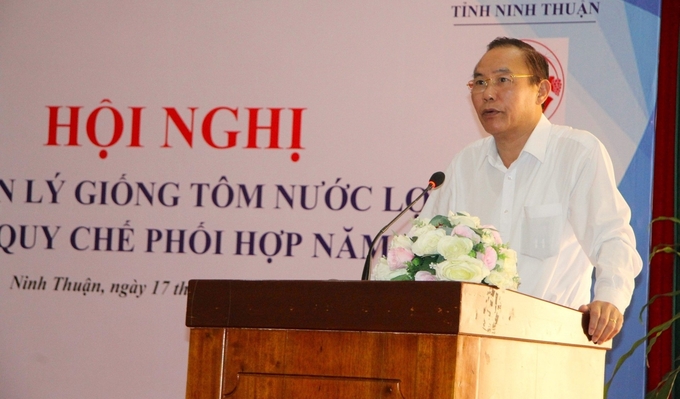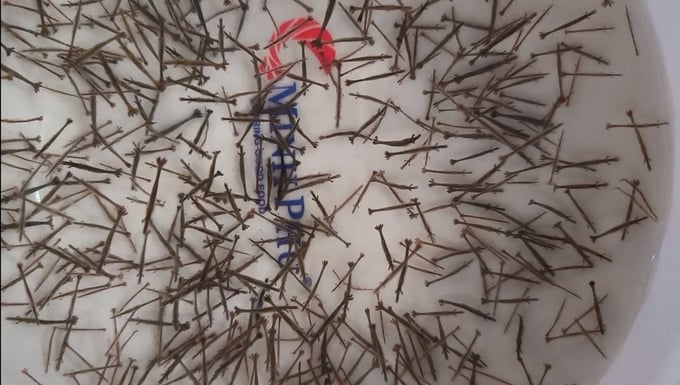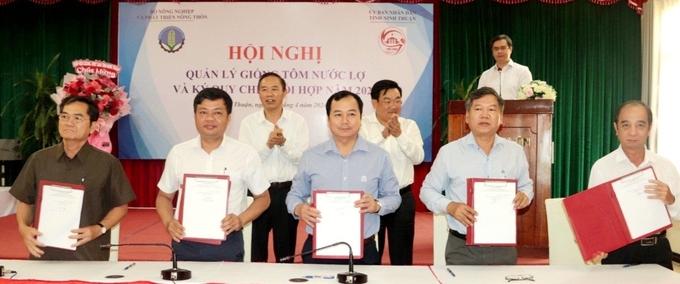May 19, 2025 | 20:24 GMT +7
May 19, 2025 | 20:24 GMT +7
Hotline: 0913.378.918
May 19, 2025 | 20:24 GMT +7
Hotline: 0913.378.918
On April 17, at Phan Rang - Thap Cham City (Ninh Thuan Province), the Ministry of Agriculture and Rural Development (MARD) partnered with the Ninh Thuan Province People's Committee to organize a shrimp seed management conference and sign a 2024 coordination rule. The conference was chaired by Deputy Minister Phung Duc Tien.
According to the Directorate of Fisheries, in 2023, the shrimp sector will confront a number of challenges, including increased fuel prices, materials, and seafood feed costs. Economic downturns reduced consumer demand in many export countries, resulting in a dramatic decline in raw shrimp prices, which posed challenges for seed production and commercial growing operations.

According to Deputy Minister Phung Duc Tien, brackish water shrimp seed production still has some shortcomings. Photo: PC.
Nonetheless, the brackish water shrimp farming area in 2023 countrywide was 737 thousand hectares, with a production output of 1.12 million tons, including 274 thousand tons of black tiger shrimp and 845 thousand tons of whiteleg shrimp. The export turnover totaled 3.45 billion USD.
According to the Directorate of Fisheries, with a total brackish water shrimp farming area of over 737,000 hectares, the present need for shrimp seeds is between 150 and 155 billion seeds, with roughly 260,000 parent shrimps required to generate shrimp seeds. Currently, there are 2,270 brackish water shrimp seed production plants and nurseries across the country, producing 153 billion seeds. Ninh Thuan, Binh Thuan, Bac Lieu, and Ca Mau are the main shrimp seed production locations in Vietnam (they account for approximately 93% of total production facilities and 63.6% of seed output).
In terms of implementing the coordination regulation for brackish water shrimp seed management, the Directorate of Fisheries quickly coordinated with localities following the seed management conference and signature of the regulation in 2023. "To far, 17 localities have signed the coordination rule, and the execution of legal provisions on aquaculture seeds has become increasingly uniform. Many localities have awarded certificates to approved production facilities, and shrimp seed nurseries have reached about 100%. Along with that, many areas have actively participated in the inspection, examination, and prosecution of businesses and individuals who have violated seed production and business norms," stated Mr. Tran Dinh Luan, Director of the Directorate of Fisheries.
According to the Directorate of Fisheries, the national shrimp production goal for 2024 is to cover 737,000 hectares with a total output of 1.065 million tons, comprising 300 thousand tons of black tiger shrimp and 765 thousand tons of whiteleg shrimp. The export turnover is estimated to range between 4 and 4.3 billion USD. To cover the shrimp farming area, the requirement for parent shrimps is roughly 260,000 - 270,000 heads, while production and nursery require approximately 140 - 155 billion shrimp seeds.

Mr. Trinh Minh Hoang, Vice Chairman of Ninh Thuan Provincial People's Committee, said that the province is striving to become a high-quality shrimp seed production center in the country. Photo: PC.
Speaking at the conference, Mr. Trinh Minh Hoang, Vice Chairman of Ninh Thuan Province's People's Committee, stated that the province currently has 453 shrimp seed production establishments, supplying over 40 billion shrimp seeds to the market each year, accounting for more than 30% of national shrimp seed production.
Ninh Thuan Province wants to become a national hub for high-quality shrimp seed production, with well-invested seed production infrastructure. By 2030, the province hopes that 20% of its facilities will have a minimum production capacity of 0.5 billion seeds per year; all facilities meet regulatory criteria for producing aquaculture seeds and are monitored for disease safety against harmful diseases. The yearly shrimp seed production aim is to exceed 60 billion seeds, and all shrimp seeds distributed inside the province must be thoroughly inspected and meet quarantine inspection requirements.
At the meeting, a representative from Minh Phu Seafood Corporation indicated that, while shrimp prices fell globally in 2023, they rose at the start of 2024. Minh Phu Seafood Corporation requires a big supply of raw materials for shrimp processing, however the current shrimp farming situation remains challenging due to high seed prices.
However, because of the use of biotechnology in shrimp farming, the firm's production of shrimp seeds is very efficient and consistent, essentially supplying enough for the corporation while fulfilling the needs of farmers at reasonable costs.

Shrimp seed products of Minh Phu Seafood Group: Photo: MP.
Finally, Deputy Minister Phung Duc Tien expressed his appreciation for the achievements of the brackish water shrimp seed production sector in 2023. Furthermore, the effective implementation of coordination regulations in seed management has contributed to the formation of connections between seed production areas and consumption areas, transparency in information management, seed production and supply, and seed quality improvement to meet market demands.
However, Deputy Minister Phung Duc Tien claims that there are still certain difficulties in brackish water shrimp seed production. We have not completely gained control of parent shrimp production. Legal restrictions in shrimp seed management are not often strictly followed, particularly in terms of facility conditions, seed conditions prior to circulation, and seed quality during circulation.
According to projections, the shrimp industry will continue to encounter numerous difficulties and obstacles in 2024. To meet the shrimp industry's goals by 2024, Deputy Minister Phung Duc Tien suggested that agencies, units, associations, localities, production facilities, and shrimp seed nurseries concentrate on implementing solutions.

The parties sign a regulation on coordination in aquatic breed management in 2024. Photo: PC.
Specifically, it is required to aggressively produce domestic parent shrimp sources. Form partnerships in research and production, with a focus on collaboration between firms and research units, to quickly move products into practical manufacturing. Continue to explore, hybridize, and select parent black tiger shrimp and whiteleg shrimp with quick growth and tolerance to common diseases for seed production and commercial farming.
Furthermore, information should be disseminated to aquaculture seed production and business facilities so that they may completely comply with the Fisheries Law and guiding documents, particularly the new points relating to brackish water shrimp seed management. Focus on arranging the implementation of regulatory restrictions on brackish water shrimp seed management, with a particular emphasis on inspecting production conditions and maintaining seed quality during production and circulation.
Implement biosecurity precautions in both seed production facilities and brackish water shrimp seed nurseries. Establish production facilities and shrimp seed nurseries in disease-free directions. Implement effective monitoring and control of water quality for shrimp seed production, etc.
Translated by Linh Linh

(VAN) As a doctoral student doing research on renewable energy and electrification at Harvard University, the author shares his musings on electricity, nature, and countryside memories.

(VAN) The decree on Extended Producer Responsibility (EPR) ensures transparent management and disbursement of support funds, avoiding the creation of a “give-and-take” mechanism.

(VAN) Hue City rigorously enforces regulations regarding marine fishing and resource exploitation, with a particular emphasis on the monitoring of fishing vessels to prevent illegal, unreported, and unregulated (IUU) fishing.

(VAN) Hanoi People's Committee has issued a plan on reducing greenhouse gas emissions in the waste management sector with 2030 vision.

(VAN) Vietnam's draft amendment to Decree No. 156 proposes a mechanism for medicinal herb farming under forest canopies, linking economic development to population retention and the sustainable protection and development of forests.

(VAN) In reality, many craft village models combined with tourism in Son La have proven effective, bringing significant economic benefits to rural communities.

(VAN) The international conference titled Carbon Market: International experiences and recommendations for Vietnam was successfully held recently in Ho Chi Minh City.